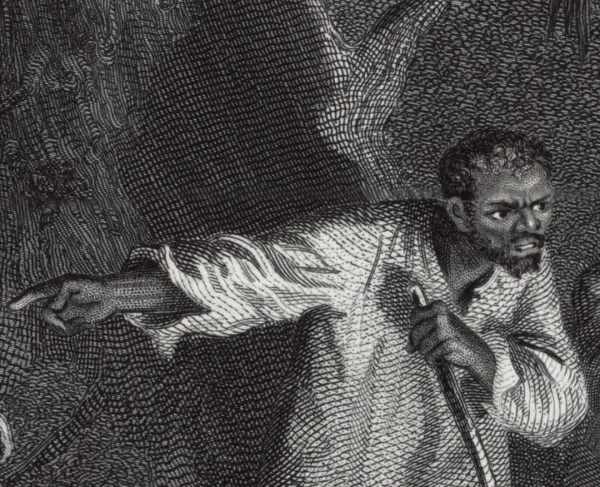Nat Turner

Nat Turner was born on October 2, 1800, in Southampton County, Virginia, as a slave of Benjamin Turner. His mother was an enslaved woman named Nancy, but his father is unknown. Turner was allowed to learn how to read and write, and he was instructed in religious matters. As a result, Turner became devoutly religious, spending his free time reading the Bible, praying, and fasting. As a child, some even thought he would become a prophet, due to his uncanny ability to describe events that happened before he was born. He would eventually become a preacher, believing he received messages from God through visions and nature.
In 1821, Turner ran away from the plantation of Samuel Turner, his former owner’s brother. He hid in the woods for a month and only returned after receiving what he saw as a sign from God. When Samuel died, Thomas Moore – and then his widow – became his new owners. When the widowed Moore married John Travis, Turner was sent to work on Travis’s land.
Turner received a vision in 1825 of impending bloody conflict between blacks and whites; three years later, he received another message that he should lead an assault against Satan’s forces – white slaveowners. He began to prepare and waited for another sign from God about when to take action. This sign came in February 1831, when an eclipse blocked out the sun. Turner and a small group of supporters planned to launch the attack on July 4, but Turner fell ill and had to delay it. Then, on August 13, a strange atmospheric disturbance caused the sky to turn blue-green, which Turner took as a sign to begin his rebellion.
A week later, on August 21, 1831, Turner and his supporters began a revolt against whites in Southampton County. He killed the Travis family as they slept, then took to horses, and spread the violence throughout the county. As the rebels traveled, they recruited other slaves and stole ammunition from neighboring plantations, killing all of the whites they encountered. Turner had initially planned to take over the county seat of Jerusalem and acquire more weapons from the armory there but was stopped by an armed white militia just outside the town. Chaos ensued, and the rebels were routed as Turner fled into the woods. Fifty-five whites were killed in Turner’s short-lived rebellion, and in retribution, white mobs roamed the county and lynched blacks, even if they had no involvement in the uprising. Estimates of those killed in the aftermath range from 100 to 200.
Turner was captured on October 30, 1831, and plead not guilty, as he believed his rebellion had been the work of God. While in the county jail, he dictated his “Confessions” to his lawyer Thomas R. Gray. He was immediately sentenced to death by hanging, which was carried out on November 11. Many of his co-conspirators met the same fate; others were banished.
Nat Turner’s rebellion was “the great Virginia nightmare: a midnight massacre of men, women, and children in their beds and cribs.” Fear was struck into the hearts of slave owners across the South, leading to harsher slave codes and ending already weak plans for gradual emancipation. In the North, as news of Turner, his rebellion, and fate spread, the abolitionist movement intensified. Turner’s rebellion was one of the many events that increased sectional tensions in the years leading up to the Civil War.





